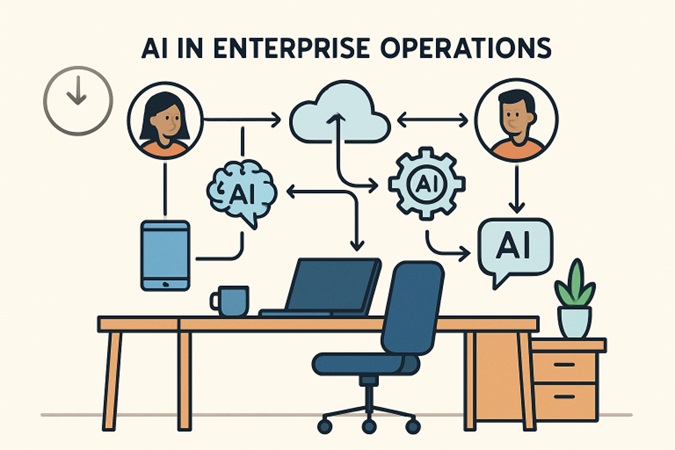Artificial Intelligence (AI) is fundamentally transforming the modern business landscape, catalyzing unprecedented levels of efficiency, accuracy, and innovation. Whereas enterprises once relied on manual processes and siloed technologies, today’s organizations must embrace seamless digital solutions to remain relevant in an increasingly cutthroat global marketplace. This rapid pace of change and fierce competition necessitates strategic investment in advanced technologies, and AI stands at the heart of this evolution. By embedding AI into daily workflows, companies open doors to operational improvements that just a decade ago would have seemed impossible. As leading industry analysts emphasize, adopting AI enterprise software is rapidly moving from a mere option to a strategic imperative for forward-thinking businesses seeking to secure long-term growth and resiliency.
Whether it be analyzing massive and complex datasets, automating repetitive or time-consuming tasks, or even guiding high-level strategic decision-making, AI has become core to maintaining agility and a competitive edge. Enterprise leaders are now tasked with weighing the transformative opportunities AI presents against the ongoing need for responsible risk and change management. The secret to thriving in an AI-driven economy lies with those organizations that act decisively—championing innovation, overseeing careful implementation, and preparing their people for the demands and rewards of the new digital landscape.
Understanding AI In Enterprise
AI refers to a set of technologies and mathematical frameworks engineered to allow computers to mimic or extend aspects of human intelligence—including learning from experience, reasoning, perception, and problem-solving. When these technologies are harnessed in an enterprise environment, their primary focus is on delivering scalable, practical solutions that address real-world business challenges. Enterprise AI leverages intelligent automation, advanced analytics, and predictive modeling to drive performance gains across business functions, from streamlining operations to modernizing marketing strategies and revolutionizing HR management. Landscape studies highlight just how critical AI has become for automating repetitive processes, interpreting massive amounts of data, enabling real-time insights, and enhancing the reach and sophistication of natural language processing.
The application of AI in modern enterprises is both diverse and rapidly evolving. Enterprises utilize AI-powered chatbots to provide real-time, always-on customer service, drastically improving client satisfaction and operational availability. In logistics and manufacturing, sophisticated machine learning algorithms analyze complex supply chains to predict disruptions before they occur. Advanced analytics platforms empower organizations to fully leverage data collected from myriad sources and channels, uncovering actionable insights that were previously inaccessible. Together, these AI systems form the backbone of comprehensive digital transformation strategies, implemented not only by multinational giants but also by startups seeking scalable differentiation.

Key Benefits Of AI Integration
- Enhanced Efficiency: By automating repetitive, rule-based, and labor-intensive tasks, AI transforms how employees spend their time at work. This not only reduces human error and increases productivity but also frees staff to focus energy on more creative or strategic initiatives, helping to boost overall morale and job satisfaction.
- Improved Decision-Making: AI systems excel at processing, comparing, and synthesizing gigabytes—or even petabytes—of structured and unstructured data. This ability to rapidly extract insights supports clearer, more informed business decisions, facilitating both quick wins and long-term risk mitigation strategies.
- Cost Reduction: As manual processes are automated and operational workflows optimized, businesses see substantial reductions in costs, from labor expenses to resource consumption. AI-powered predictive maintenance, for example, helps companies address potential breakdowns before they escalate, avoiding costly downtime and waste.
According to a recent report, more than half of companies that have implemented AI technologies at scale are already reaping significant value. These organizations highlight improved service delivery speed, enhanced customer experiences, and measurable financial benefits as the top reasons for continuing to invest in AI as a cornerstone of their business models. AI also enables iterative learning and improvement, revolutionizing everything from financial modeling to brand engagement.
Challenges In Implementing AI
While the upward trajectory of AI presents numerous advantages, enterprises must overcome a series of tangible challenges to ensure sustainable implementation:
- Data Quality: To produce reliable insights, AI systems depend on access to large volumes of high-quality, well-structured data. Organizations struggling with fragmented, incomplete, or biased data can quickly find their AI initiatives floundering. Ensuring clear data stewardship and ongoing data validation is therefore an essential piece of the puzzle.
- Change Management: The introduction of AI frequently triggers resistance—stemming from employee fears about job security, discomfort with new workflows, or attachment to established processes. Successful change management requires transparent communication, genuine leadership support, and programs to foster a culture of innovation and adaptability at every level of the organization.
- Skill Gaps: The shortage of AI-literate professionals, such as data scientists, machine learning engineers, and AI architects, remains a persistent barrier for many enterprises. Upskilling existing teams and recruiting specialized talent is paramount to executing and maintaining robust AI projects.
Best Practices For AI Adoption
To realize the full value of AI investments, organizations must balance experimentation with structured planning and transparency. Proven approaches to AI adoption include:
- Start Small: Begin by rolling out pilot projects in carefully controlled environments where impacts can be measured objectively. Use evidence and insights gleaned from these projects to assess value and inform broader scaling across the enterprise.
- Invest in Training: Proactively investing in staff skills ensures employees stay aligned with the evolving technological landscape. Offering continuous education and targeted upskilling not only helps teams adapt but also drives buy-in and increases overall project effectiveness.
- Ensure Data Governance: Robust data policies that address proper data sourcing, privacy protections, high-quality standards, and ethical considerations are fundamental to both building stakeholder trust and complying with international regulations.
Case Studies Of Successful AI Integration
Case Study 1: Financial Services
A major global financial institution introduced AI-powered chatbots to handle a large percentage of customer support queries. The result was a 30 percent decrease in average response times and a substantial improvement in both customer satisfaction scores and agent productivity, freeing up staff to address complex issues and focus on higher-value tasks.
Case Study 2: Manufacturing
A Fortune 500 manufacturer implemented an AI-driven predictive analytics platform to anticipate when machinery would require maintenance or repairs. By improving anticipation and scheduling, the company achieved a 25% reduction in unplanned factory downtime and millions of dollars in recurring annual savings.
Case Study 3: Retail
In the retail sector, leading businesses deploy sophisticated AI recommendation engines to provide customers with tailored product suggestions at scale. These improvements in personalization not only increase conversion rates and revenues but also allow businesses to optimize pricing, inventory, and supply chain flows for even greater efficiency.
Future Trends In Enterprise AI
The future of enterprise AI is being shaped by a convergence of advanced generative AI models, explainable AI (XAI), and the rise of distributed, AI-powered ecosystem platforms. Organizations are poised to increase their investments in real-time process automation, dynamic analytics, and collaborative digital workforce tools. Developments in cloud and edge AI, along with the growing importance of ethical AI governance frameworks, are expected to further transform how businesses operate and compete globally.
Conclusion
Integrating AI into enterprise operations stands as one of the most impactful drivers of business transformation today. By understanding both the benefits and challenges and adhering to industry best practices, organizations can build robust, flexible strategies for AI adoption. With thoughtful planning, a focus on data quality, and a well-supported workforce, enterprises will pave the way for innovation, efficiency, and sustainable growth in the era of intelligent automation.
